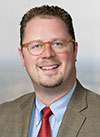At the State Bar of Wisconsin’s Annual Meeting & Conference in June, I had the privilege of moderating the opening plenary session on the topic of “cancel culture,” one label applied to a familiar phenomenon that has also been described as “consequence culture” by some who view the phenomenon more favorably. Joining me on the panel were Judge Janice Rogers Brown, who grew up in the segregated South and served on both the California Supreme Court and the U.S. Court of Appeals for the D.C. Circuit; Judge William Griesbach of the U.S. District Court for the Eastern District of Wisconsin; and Professor Franciska Coleman of the U.W. Law School.
 James E. Goldschmidt, Harvard 2012, practices with Quarles & Brady LLP, Milwaukee, where he chairs the firm’s Appellate and Critical Briefing Practice. He is a member and former chair of the State Bar of Wisconsin’s Appellate Practice Section, and currently serves on the Wisconsin court system’s Planning and Policy Advisory Committee (PPAC).
James E. Goldschmidt, Harvard 2012, practices with Quarles & Brady LLP, Milwaukee, where he chairs the firm’s Appellate and Critical Briefing Practice. He is a member and former chair of the State Bar of Wisconsin’s Appellate Practice Section, and currently serves on the Wisconsin court system’s Planning and Policy Advisory Committee (PPAC).
What emerged from the panel was something that seems all too rare these days: a real discussion. I promised at the outset that the panelists were not likely to agree on everything, and they certainly did not. But they provided their perspectives on the topic in a way that managed to be both forceful and respectful, both candid and civil. More than any conclusion we reached – and for such a volatile and rapidly developing topic, conclusions are not easy to come by – I was struck by the value of the exchange itself: the virtue of respectful disagreement, played out in real time, before an audience of hundreds of listeners.
That exchange gave me hope. The current political climate and state of social media provide only too many reasons to despair that discourse (whatever that once meant) will never come back. This was one strong example to the contrary and showed that when people make up their minds to commit to that old judicial concept audi alteram partem (“Hear the other side”), bridges can be built and chasms can be crossed.
Did we “solve the problem” or even come to a common understanding of the problem? Not in the time we had. But that wasn’t the point. The debate over “cancel culture” – even what to call it! – will continue. I suspect that until there is communal agreement on which types of speech merit protection – not just in the First Amendment, freedom-from-governmental-interference sense, but in the broader sense of community norms – we will be unable to come to a consensus on the role of callouts, public shaming (what Professor Coleman refers to as “the pillory”), and consequences in the public discourse.
But in the meantime, we lawyers have a key role to play. We can keep the conversation going. We can model what we were trained to do: evaluate objectively, speak civilly, listen for understanding, and dig for more. Ideally, we can do that not only on social media but in real conversations, looking each other in the eye. To do that, we don’t need two judges, a professor, and an annual convention. We just need a willingness to build up our communities, one candid conversation at a time.
[The panelists] provided their
perspectives on the topic in a
way that managed to be both
forceful and respectful, both
candid and civil.
» Cite this article: 96 Wis. Law. 72 (October 2023).
